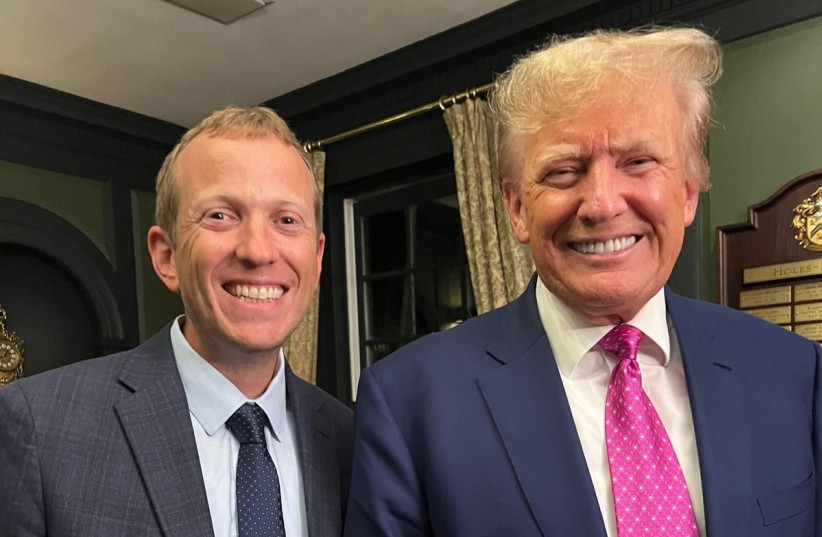Last week, I had the privilege of attending a screening of Sound of Freedom with former president Donald Trump at his golf club in Bedminster, New Jersey. As the only guest from Israel, it was an unusual experience for me. I found myself mingling with jovial golfers before the film and witnessed those same country club members wiping their eyes and applauding in a standing ovation following the final credits.
In our often superficial culture, Sound of Freedom is a breath of fresh air and I am grateful that America’s surprise summer hit promotes the Torah’s highest value: protecting God’s children. But instead of celebrating this extraordinary movie, the Jewish Telegraphic Agency, along with many other media outlets, have inexplicably smeared it as antisemitic. Is there any basis for their accusation?
Sound of Freedom tells the heart-wrenching true story of Tim Ballard, a former Homeland Security agent. The movie begins in Honduras, where a poor father of two is approached by a child talent agent who invites the kids in for a photo shoot. When the father returns to the agency office a few hours later to pick up his son and daughter, they are gone, sold by the talent agent to be used as sex slaves. Ballard gets assigned the case and embarks on a relentless journey to rescue the siblings against all odds.
By the end of the film, Ballard’s character tracks down the victims on an island used by wealthy predators for their perverse pleasures in a dramatic scene reminiscent of the sick activities that took place on Jeffrey Epstein’s private island in the Caribbean.
As an aside, the vile exploitation of children portrayed in Sound of Freedom reminded me of the demonic ways that Hamas recruits child soldiers in Gaza to fight against Israel and to be used as human shields, as reported this month in The Jerusalem Post.

Why is the film controversial?
Sound of Freedom has sounded the alarm on human trafficking, the fastest-growing criminal enterprise in the world today. The movie claims that there are more people enslaved today as sex slaves than at any other time in history, even when slavery was legal.
Made for only $14 million and distributed by Angel Studios, Sound of Freedom has already made more than $125 million at the box office since its release on July 4. The summer hit is even more noteworthy since ticket sales were largely driven by Angel’s innovative “pay it forward” model. Movie watchers attend for free and then scan a QR code at the end of the film to buy tickets so that others can come at no cost as well.
So why has the movie been called “2023’s most controversial film”? The answer lies in Tim Ballard’s memorable line: “God’s children are not for sale.” The religious undertones and the actor’s faith have made the movie a target.
Even though Sound of Freedom received a 100% audience score from Rotten Tomatoes, and has been endorsed by everyone from Ben Shapiro to Tony Robbins, JTA dismissed the film as a “thriller lauded by QAnon conspiracy theorists and high-profile Republicans.”
The JTA article, published in The Jerusalem Post under the headline, “Surprise blockbuster Sound of Freedom echoes antisemitic QAnon conspiracies” bashed the film. The article said that the film “also draws from a conspiratorial well that includes a number of anti-Jewish canards, including the ‘blood libel’ accusation, while its star, actor Jim Cavaziel, has floated antisemitic theories in interviews promoting the film.”
With Hollywood producing so many movies that promote harmful messages for children, it’s sad that Jewish media would attack a movie that actually protects kids, especially with flimsy accusations of antisemitism. If anything, a movie that glorifies an American hero, whose admirable spirit and unwavering determination to bring justice to voiceless children, should be embraced by Jewish moviegoers for shining a light on Torah values, especially at this time of year.
In one of the most sorrowful prayers that make up the liturgy of Judaism’s saddest day, Tisha Be’av (the 9th of Av, tomorrow), we read about the tragedy that occurred to the children of Ishmael, the last high priest who served in the Temple. Ishmael’s young son and daughter were kidnapped and sold by the Romans who destroyed the Temple in 70 CE, and because of their good looks, were placed together in a dark cell and ordered to have sex.
The siblings didn’t recognize each other, yet each refused to obey, for as the offspring of the high priest, they inherently understood that God’s children are not for sale. The Talmud reports (Gittin 58a) that when the brother and sister cried out to the heavens, their souls left their bodies. “And with regard to them and others like them, Jeremiah lamented: ‘For these things I weep; my eye, my eye runs down with water.’” (Lamentations 1:16)
On the most bitter day of the Jewish calendar, we fast in mourning the devastating loss of our two Temples which, combined, stood in Jerusalem for more than 800 years. However, on Tisha Be’av we don’t only mourn for our national disasters that had a profound impact on the vast expanse of Jewish History. We remember and cry for one brother and one sister who were cruelly imprisoned to be used as sex slaves two millennia ago.
For anyone looking for a meaningful movie to watch on Tisha Be’av afternoon, I highly recommend Sound of Freedom – a painful but important film. As Jews, we know all too well, that, “God’s children are not for sale.”
The writer is the founder of Israel365 and editor of The Israel Bible, both dedicated to strengthening relationships between Jews and Christians in support of Israel. He can be reached at RabbiTuly@Israel365.com.
